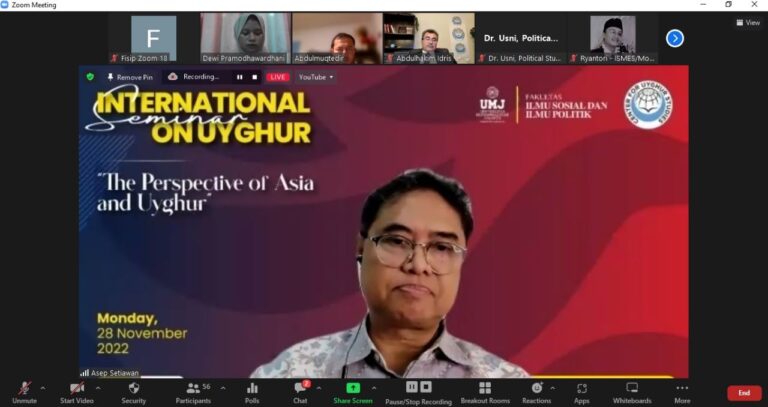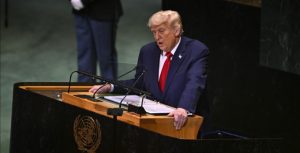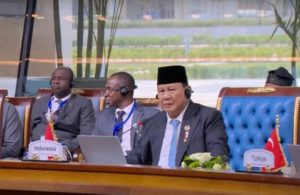Jakarta, MINA – Muslim countries both in Asia and in the Middle East are generally cautious and have yet to give a firm position in their stance on the issue of human rights violations that befell the Uyghur ethnic group in China.
Those are the main threads of the International Seminar on Uyghur Issues with the theme “Asian and Uyghur Perspectives” which was held virtually on November 28, 2022 as stated by the Head of Political Science Masters Program in FISIP Muhammadiyah University Jakarta (UMJ) Dr. Asep Setiawan to the press in Jakarta on Thursday, December 1, 2022.
Other speakers at the seminar were Executive Director of the Center for Uyghur Studies Abdulhakim Idris in Washington and Abdulmuqtedir Udun, Program Manager of the Center for Uyghur Studies which was established in 2020 in Ottawa Canada.
Besides that, Dr. Ryantori from Prof. University. Dr. Moestopo (Religion), Dean of FISIP UMJ Dr. Evi Satispi M.Sc and Chair of the Political Science Study Program at FISIP UMJ Dr. Usni and attended by 108 participants from various universities in Indonesia and one person from Islamabad Pakistan.
Also Read: At Least Nine Children and One Woman Killed in Pakistani Airstrike on Afghanistan
Quoting Abdulhakim Idris, Asep said that the support of Muslim countries is very important in efforts to protect the Uyghur Muslim ethnic group in China from “ethnic cleansing”.
But so far the support of Muslim countries is still weak, partly because of China’s economic diplomacy.
In fact, the support of Muslims in various countries is very important so that the Uyghur issue gets international attention and China changes its policies that threaten the Uyghur ethnicity.
It was stated, the Uyghur community in China’s Xinjiang received unfair treatment from the Chinese government. This can be seen from the various prohibitions against Uyghur Muslims who want to practice their religion, so that the Uyghur diaspora mobilized to seek international support.
Also Read: Academic Boycott of Israel Doubles Despite End of Gaza War
Meanwhile, Abdulmuqtedir Udun, Program Manager of the Center for Uyghur Studies, explained that until now threats to the Muslim Uyghur ethnic group are still ongoing.
Apart from building concentration camps in various places, the Chinese Government also issued policies to weaken the presence of the Uyghur ethnic group.
According to Abdulmuqtedir, in an effort to eliminate the Uyghur Muslim identity, a number of policies were implemented, such as replacing the call to prayer with Chinese, embarrassing the ulema by being told to dance in the field, sterilization, and orders to intermarry.
In other words, explained Abdulmuqtedir, there were attempts by the Chinese government to assimilate Uyghur culture into Han culture.
Also Read: Sudanese Army Battles RSF in Kordofan as Civilian Hardship Worsens
Even the Chinese central government’s policies have led to genocide (cleansing) of the Muslim Uyghur ethnic group.
Weak Support from Middle East Countries
Meanwhile Dr. Ryantori from Prof. University. Dr. Moestopo (Religious) explained that support from Muslims in various Middle Eastern countries is still weak for the Uyghur Muslim issue in China.
Islamic countries in the Middle East are generally careful in responding to the problem of human rights violations in the Uyghurs. Weak support, among others, is the national interest of each country when dealing with China.
Also Read: Hundreds Rally in Stockholm to Condemn Israeli Attacks and Ceasefire Violations in Gaza
China carries out a lot of diplomacy through economic instruments so that with criticism of China’s policies in the Uyghurs it is feared that trade will decrease or investment from China will decrease.
Dr. yantori gave several examples of weak support, for example Saudi Arabia. This country has recently collaborated, including in the procurement of the Covid-19 vaccine.
An indication that Saudi Arabia has played a less significant role in paying attention to the Uyghur ethnicity is evident from the expulsion of two Uyghurs due to immigration issues who should have been able to understand their situation.
On the other hand, the Organization for Islamic Cooperation (OIC) also doesn’t say much about Uygur Muslims. Iran is also wary of commenting on the Uyghur issue in China due to the intensification of their ties. Only Turkey has taken a firm stand against human rights violations in the Uyghurs.
Also Read: Mass Protests Erupt in Bologna Against Israeli Teams Ahead of EuroLeague Match
At a meeting, Turkish Foreign Minister Mevlus Cavusoglu stated that in China, Uyghurs and other Muslims have difficulty implementing religious teachings and maintaining their cultural identity. Turkey then invited Muslim countries to pay attention to the Uyghur issue.
Weak Support from Asian Countries
Previously, Dr. Asep Setiawan explained, from Southeast Asia and East Asia, policies towards the Uyghur ethnic group in China differed. The Japanese government has a clear stance against human rights violations against the Uyghur ethnic group.
Japan’s parliament passed a resolution on February 1, 2022 calling on the government to conduct “serious monitoring of the human rights situation, in cooperation with the international community”.
Also Read: UN Warns of Rapidly Worsening Humanitarian Crisis as Over 100,000 Flee Violence in Sudan
Japan also called for the “implementation of comprehensive relief measures” regarding the “serious human rights situation” in the Uyghur Region, Tibet, South Mongolia and Hong Kong.
Asep explained, Laos, Myanmar, Cambodia, the Philippines and North Korea showed their attitude of supporting the policies of the Chinese central government towards the Uyghurs. These countries do not issue criticism against China for human rights violations in the name of preventing acts of terrorism.
While Malaysia is taking a firm stance in supporting the Uyghurs by providing opportunities to flee to third world countries, and Taiwan is also taking a firm stance in having relations with the Uyghurs. On the other hand, the Government of Indonesia in recent years, according to Asep, has been silent on various events in the Uyghurs.
He said Indonesia’s silent response to the mass detention of ethnic Uyghurs and Chinese Muslim minorities in Xinjiang was not solely out of fear of offending its main trading partners, but stemmed from a variety of reasons including skepticism about allegations of human rights violations.
Also Read: Trump, Mamdani Aim for Cooperative Relationship After White House Meeting
It is said that human rights violations in the Uyghurs are a campaign from the United States. However, various groups of people in Indonesia have shown support for the fate of the Uyghur ethnic group in China. Regarding human rights violations, apart from the mass detention of Uyghurs, there have also been reports of a ban on practicing Islam for ethnic Uyghurs.
Islamic organizations in Indonesia have also criticized the behavior of the Chinese central government towards the Uyghurs even though China has tried to invite Islamic figures to the Uyghur area to demonstrate government policies there.
The Uyghurs are a Turkic ethnic group that is culturally affiliated with the general region of Central and East Asia. Uyghurs are recognized as the indigenous people of the Xinjiang Uyghur Autonomous Region in Northwest China.
They are one of 55 officially recognized ethnic minorities in China. The Muslim-majority Uyghurs are recognized by the Chinese government as a regional minority and the titular people of Xinjiang.
Also Read: 1,700 Sudanese Children Suffering From Malnutrition in Tawila Camp, Local Group Warns
The Uyghur ethnic group traditionally inhabit a series of scattered oases in the Taklamakan Desert within the Tarim Basin. The total ethnic Uyghur population in China is around 12.8 million. Moreover, the Uyghur diaspora is spread all over the world.
In Kazakhstan there are about 223,000 Uighurs, in Turkey between 100,000 and 300,000, and more than 150,000 in other countries including in the United States about 15,000 people.(L/RE1)
Mi’raj News Agency (MINA)
Also Read: Finland’s Largest Retailer Halts Israeli Product Sales



































 Mina Indonesia
Mina Indonesia Mina Arabic
Mina Arabic